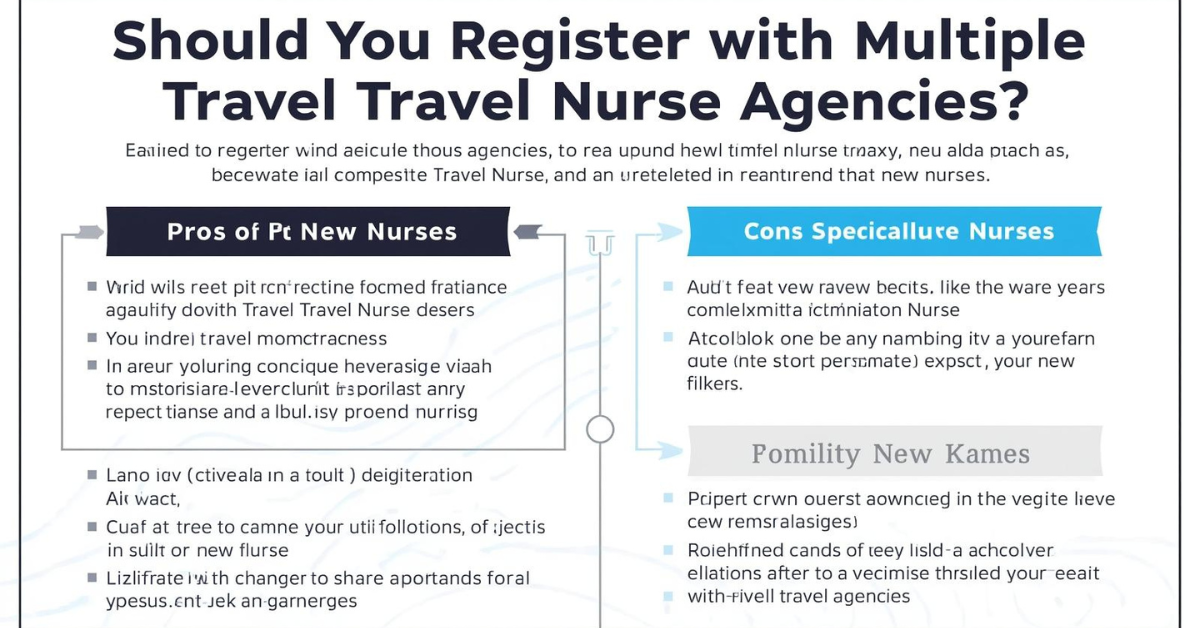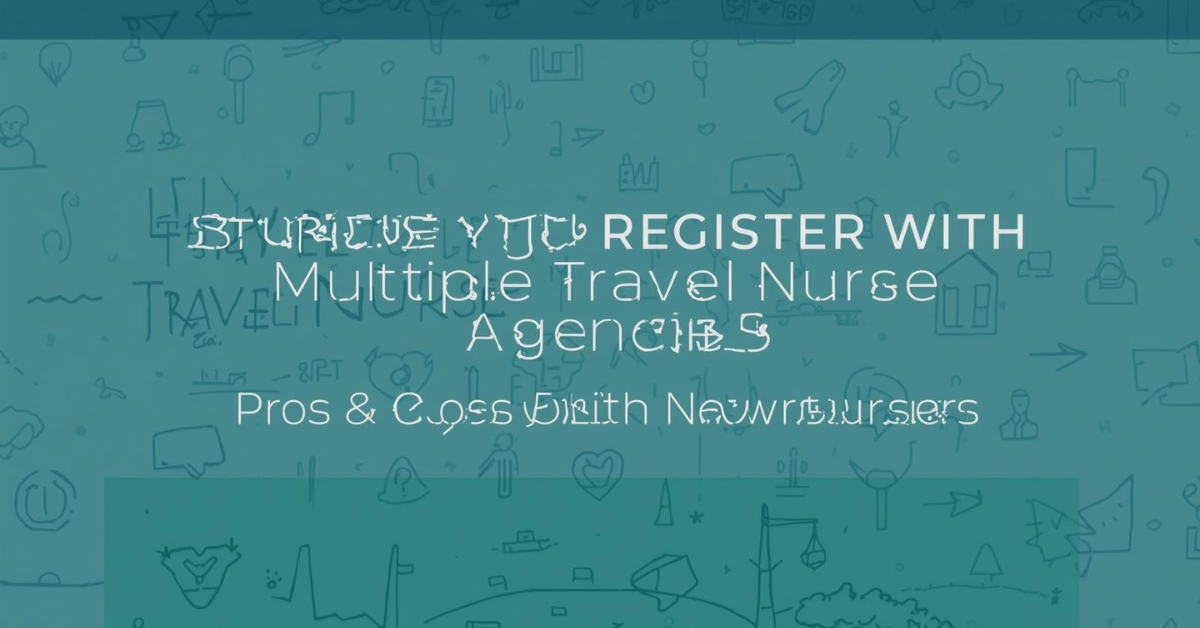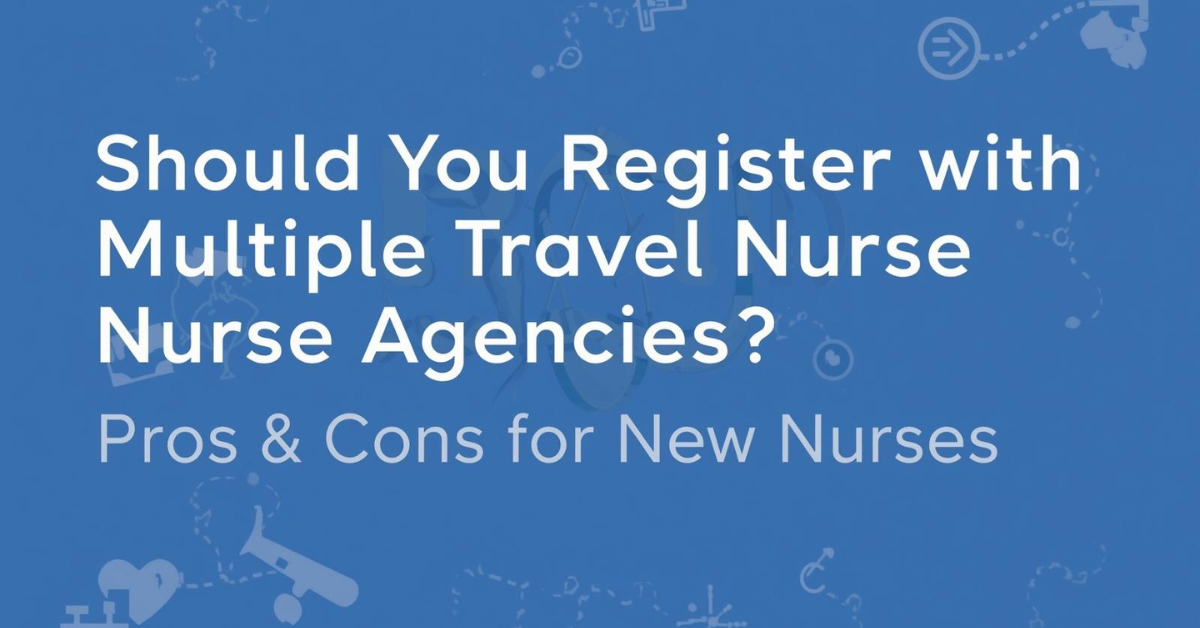Should You Register with Multiple Travel Nurse Agencies? Pros & Cons for New Nurses. Yes, it’s advisable to register with several temporary nursing agencies, as this increases job prospects, provides access to a more competitive market with better pay and benefits, and offers an important safety net. While the main drawback is the potential for confusion or hospital policies prohibiting multiple applications, the advantages of a wider range of options and a safety net usually outweigh this risk, especially for those starting out in the profession.
Pros & Cons for New Nurses: Should You Register with Multiple Travel Nurse Agencies?
Though on paper it seems like a wise decision—more job possibilities, better pay talks, and more flexibility—working with several travel nurse agencies sounds like a smart move. However, is it really the best approach for newbie travel nurses or does it generate more problems than possibilities? Understanding how agency will help you if you are getting ready to enter the world of travel nursing or just finished your NCLEX and want to maximize your earning potential. Registration systems could be the line separating a successful career from never ending scheduling mayhem.
Rapid view: Multi- Agency Registration
Average travel nurse salary: $1,800-$2,500 per week with one agency | 10-15% more potential pay with multiple agency offers | Time spent administering 3–5 hours per week with numerous recruiters; moderate to great risk of scheduling conflicts without adequate planning; best practice: begin with 1–2 agencies and develop thereafter. 6 months experience | License requirements: compact nursing license advised for greatest flexibility
What registering with several travel nurse agencies means?
Signing up with a travel nurse company is effectively establishing a professional relationship whereby the agency represents you to healthcare institutions around the country. Usually, registration asks for your nursing license, certifications, work history, and references. According on your credentials and preferences, the agency then pairs you with available travel nursing positions.
Registering with several agencies implies you are interacting with two or more staffing businesses simultaneously with access to your profile and potential for nomination for various roles. Imagine it like having several real estate agents looking for your dream house—each one has different contacts and listings, but you’re still the same buyer. From prestigious university medical centers to small rural hospitals, this method exposes you in the travel nursing world to a greater variety of hospitals and healthcare systems little rural institutions that might only fit particular agencies.
The procedure is easy but time-consuming. Every agency has its own full application, background check, drug screening, skills checklist, and credentialing procedure. You will also be given several recruiters who will phone, SMS, or email you about possible jobs. For new nurses just out of passing the NCLEX, this can seem very difficult; however, seasoned travel nurses frequently swear by the approach.
Why Multi-Agency Registration is Important for Your Nursing Career
Your earning potential, job security, and professional advancement depend on your choice to collaborate with one agency instead of several. Travel nurses who sign up with several companies claim to have a lot more bargaining capability on salary agreements. Should two agencies wish to set you in the same hospital, you may negotiate better hourly rates, lodging stipends, or completion bonuses by means of rival offers.
Financially, the statistics speak for themselves. A single-agency travel nurse could accept the first fair offer they receive, possibly leaving thousands of dollars on the table over the course of a year. Nurses working with three to four agencies can contrast pay plans side by side, so guaranteeing market-rate compensation for their area and expertise. This is especially vital in high-demand fields like intensive care unit, emergency department, or labor and delivery, where wage discrepancies can range from twenty to thirty dollars per hour among organizations for the same role.
Beyond monetary issues, many agency partnerships offer essential backup choices should a task fails. Early contract cancellations occur in travel nursing as facilities occasionally face budget restrictions, census declines, or staffing changes. Should your contract suddenly terminate and you are registered only with one agency, you might have weeks without income while your recruiter looks for a different position. Nurses with several agency ties may swiftly contact their other recruiters and perhaps set up a fresh job inside days rather than weeks.
Maintaining your nursing license and meeting continuing education needs depend also on the plan. Most state boards of nursing need a certain amount of practice hours to maintain the active status of your RN or LPN license. Having several agencies working on your behalf lowers the chance of long periods of unemployment affecting your license if you have gaps between projects. Create gaps on your resume that future employers could raise doubt about.
Head-to-Head Comparison: Single Agency vs Multiple Agencies
Single Agency Approach:
Building a strong relationship with one recruiter who is aware of your preferences, often communicates, and first priority to your placements. Keeping one set of credentials helps to streamline the documentation procedure. Preferred treatment and loyalty incentives for assignments with a high demand; reduced time spent on phone calls and emails; less double-booking risk; fewer schedule conflicts; facility clearances and streamlined reference checks.
Multiple Agency Approach:
Access to considerably more employment postings throughout many hospital systems and healthcare networks. Competitive compensation negotiations when many companies wish to place you. Alternate options if your primary agency experiences slow seasons. Exposure to various benefits provided by agencies, including health insurance, 401k matching, and licensing reimbursement. More geographical flexibility results from several agencies possessing better connections across several areas. Agency-specific hazards including late payments or poor recruiter assistance offer safety.
The Cost Factor:
Single agency nurses reduce administrative labor by around three to five hours per week. While many agency nurses spend more time maintaining credentials, when they successfully negotiate between conflicting bids they make on average ten to fifteen percent more income. Furthermore, every agency demands its own compliance documentation—multiple TB tests, drug screenings, and background checks unless you employ a credentials management provider.
Contract Flexibility:
One agency implies simpler contract conditions and more explicit expectations regarding extensions and future tasks. Several organizations develop intricacy around non-compete clauses, radius limits, and temporal correlation of projects carried out at the same building. As most facilities use a first submission rule locking you to, you must carefully monitor which agency initially referred you to which hospital. Which agency originally transmitted your profile?
Smaller boutique agencies
Often give more customized service and flexibility, whereas larger agencies with exclusive hospital contracts may offer better amenities. Working with a mix of both gives you the best of both worlds—access to premier teaching hospitals through major agencies while also having regional specialists which ones are knowledgeable of every hospital in particular states or cities.
Your Step-by-Step Action Plan for Multi-Agency Success
Before sending any applications, first thoroughly investigate and assess companies. Give first priority to organizations specializing in your clinical area rather than to general staffing firms if you work in an emergency room. Search travel nursing communities, Facebook groups, and websites such Highway Hypodermics or BluePipes for online reviews. Note allegations of late paychecks, uncommunicative recruiters, or hidden costs lowering your take-home pay.
Once three to five reliable agencies have been found, finish your first applications deliberately. During your first week, avoid applying to all of them at once. Register with your first preference first, then, and go through their whole credentialing procedure. This helps you to get a baseline grasp of the papers you will want as well as the length the process takes. Start the application process with your second option after you have obtained your first assignment or at least finished credentialing with Agency One.
From the start, set explicit communication boundaries with every recruiter. Tell them you are working with many agencies; this honesty avoids embarrassing circumstances when two recruiters from different firms telephone the same hospital about you. Define your preferred contact methods as well as response time expectations. Some nurses develop a basic spreadsheet noting which recruiter gave which job opportunity, compensation package information, and application deadlines. This organizational approach helps you to avoid inadvertently accepting two overlapping tasks or forgetting which agency first sent you to a specific hospital.
When assessing proposals, go beyond the stated hourly rate. In addition to non-taxable stipends for food and lodging, travel nursing salary includes taxable hourly rates. Two packages with the same whole weekly income may break down quite differently taking into account taxes, benefits, and out-of-pocket expenses. For a complete analysis, see each recruiter. Gross hourly rate, projected take-home after taxes, housing grant amount, meals and incidentals stipend, travel compensation, license reimbursement, and any completion bonuses analysis list. Only with this whole perspective can offers be exactly compared.
Before taking on any job, make sure the agreement permits you to keep working for other businesses for future roles. Certain agencies have clauses demanding exclusivity during your contract time or prohibiting you from working projects in the same facility via another agency for six to twelve months following your contract termination. These limits might seriously restrict your future possibilities, therefore negotiate them out of your contract or select agencies with more nurse-friendly conditions.
Professional Advice from Nurse Educator’s Perspective
The biggest error inexperienced travel nurses make with several agencies is not informing them when they accept a job. Tell your recruiters at Agencies B and C right away that you are not available for the specific dates of your contract. This simple kindness preserves your professional reputation and saves time on both sides.
Your recruiters will favor those nurses who clearly communicate for high assignments going forward. They will recall those nurses. Moreover, never let several agencies submit you to the same hospital; these behaviors known as double submission can get you banned from that facility permanently and harm your relationship with both agencies.
Making the Multi-Agency Strategy Work for You
Good management of several travel nurse agencies calls for preparation, open communication, and reasonable time commitment expectations. For nurses with at least one year of acute care experience who feel sure navigating several job situations and can adjust, the approach is most effective rapidly to hospital rules and new electronic medical record systems. For new graduate nurses or those who have just passed their NCLEX, think about beginning with one fantastic agency to create your travel nursing expertise before extending to several collaborations.
Though every specialty and individual choice influence the ideal number of agencies, most seasoned travel nurses find three to four to offer best coverage without becoming unmanageable. This provides you with enough alternatives to evaluate possibilities and bargain for high pay while maintaining a modest administrative load. Beyond four agencies, you will probably see decreased returns: the same jobs show up across many agencies, and you will spend more time managing recruiter connections than actually practicing as a nurse.
Your plan is also shaped by geographical factors. Should you be ready to travel anywhere in the United States and have a small nursing license through the Nurse Licensure Compact, many agencies do great work sense since various companies have more developed regional hospital ties. While one agency shines in Texas or Florida, another might control placements in California. But if you would rather stay inside one state or area, you could get comparable outcomes with just one or two companies specializing in your target region.
Your rapport with your recruiter is as valuable as the agency itself. Even if your agency doesn’t always have the highest-paying tasks, keeping a responsive, honest recruiter who knows your career objectives is worthwhile. You will find these professional contacts very helpful when you want insider knowledge about facility culture prior accepting a job, need fast placement, or have unusual conditions needing flexibility. Consider your recruiters as collaborators in your professional achievement, react quickly to their messages, and offer comments on your tasks so that they may match you more accurately with next possibilities.
The multi-agency strategy eventually lets you manage your travel nursing career. You are not relying on one company’s open projects or at the mercy of one recruiter’s load. This approach lets you maximize your earning potential, reduce gaps between assignments, and create a varied professional network across the healthcare staffing sector when carried out intelligently. Remember that more possibilities mean more responsibility for controlling your professional obligations and keeping open communication with everyone engaged in your success.
Following: High-paying travel nurse specializations where new RNs can make $3,000+ per week.
Often Asked Questions on Multiple Travel Nurse Agencies
Am I allowed legally to sign up with several travel nursing companies at once? Yes, it is fairly lawful and usual practice in the travel nurse profession. Laws or nursing board rules do not stop you from interacting with many organizations. Double submission problems could disqualify you from the job; hence you must make sure just one agency presents you to any particular hospital or healthcare facility.
With how many travel nurse firms should a novice nurse register?
Beginning with one to two agencies for their first six months, new travel nurses may get knowledge of the business without getting overburdened. One’s negotiating leverage and perfect job access without too much administrative load come from growing to three to four agencies after some experience. More than five agencies almost never offer extra perks and complicate the handling of several recruiter connections.
Will working with several agencies influence my health insurance coverage or perks?
Every agency provides separate benefits packages; therefore you will need to choose which agency’s benefits to utilize depending on your employment status with each. Generally, you will get advantages from the agency you are working for. Before signing contracts, compare the health insurance expenses, coverage alternatives, 401k matching, and other perks of each agency. Some nurses organize their tasks to be eligible for benefits from the agency giving the finest package.
Do travel nurse companies demand nurses any costs for registration or placement?
Bona fide travel nursing agencies should never charge nurses for registration, credentialing, or employment placement. The hospitals and healthcare institutions that recruit their nurses provide agencies their income. Consider it a red flag if an agency asks you to pay for anything other than your own licensing renewals or certifications that you would need in any event and search for another business.
How should I stop several agencies from sending me to the same hospital?
Before your profile is submitted, clearly discuss with all of your recruiters which facilities you’re interested in. Tell all you’re other recruiters that facility is now off-limits if you show interest in a particular hospital. Maintain a tracking spreadsheet indicating the dates on which particular agency submitted you where most facilities use a first submission wins rule, which gives the agency that submitted your profile first exclusive placement there; therefore, in competitive markets timing is crucial.
Read More:
https://nurseseducator.com/didactic-and-dialectic-teaching-rationale-for-team-based-learning/
https://nurseseducator.com/high-fidelity-simulation-use-in-nursing-education/
First NCLEX Exam Center In Pakistan From Lahore (Mall of Lahore) to the Global Nursing
Categories of Journals: W, X, Y and Z Category Journal In Nursing Education
AI in Healthcare Content Creation: A Double-Edged Sword and Scary
Social Links:
https://www.facebook.com/nurseseducator/
https://www.instagram.com/nurseseducator/
https://www.pinterest.com/NursesEducator/
https://www.linkedin.com/company/nurseseducator/
https://www.linkedin.com/in/nurseseducator/
https://www.researchgate.net/profile/Afza-Lal-Din
https://scholar.google.com/citations?hl=en&user=F0XY9vQAAAAJ



abc123123123123
Hi nurseseducator.com Admin!
Hello nurseseducator.com admin, Thanks for the well-researched and well-written post!